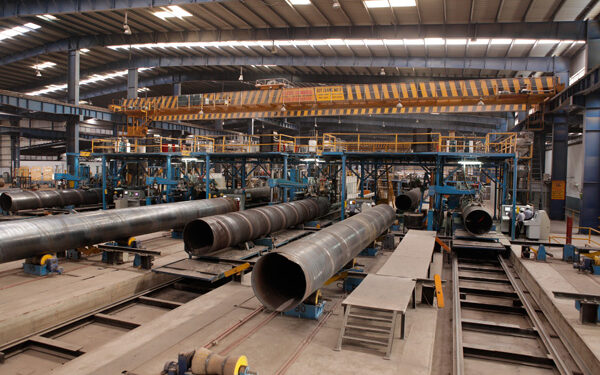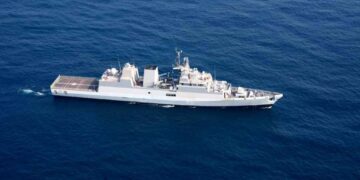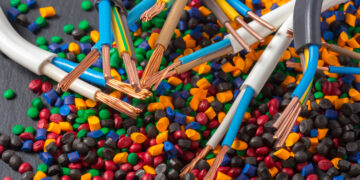JINDAL SAW LIMITED
Know the Company
Jindal Saw Ltd, previously known as SAW Pipes Ltd, is a leading manufacturer and supplier of iron and steel pipe products. Established in 1984 in Mathura, Uttar Pradesh, Jindal SAW is a part of the O.P. Jindal Group, one of India’s largest industrial conglomerates with diversified interests spanning across steel, power, mining, and infrastructure sectors.
The company has eight manufacturing facilities located in Kosi Kalan, Uttar Pradesh, Nashik, Maharashtra, and Mundra, Gujarat. Moreover, it also has its operations overseas to the USA, Italy, Algeria, and the UAE (MENA region).
The Company’s business operations are highly structured, organized into four strategic business units: Large Diameter Submerged Arc Welded Line Pipes (SAW Pipes), Seamless Pipes & Tubes, Ductile Iron (DI) Pipes, and Stainless Steel Seamless and Welded Pipes. Its products find applications across various sectors, including oil and gas exploration, transportation, power generation, water supply for drinking, drainage, irrigation purposes, and other industrial applications.
Strength
Jindal SAW began its operations with a single product in 1985. However, over the years, the company has significantly expanded its product portfolio to cover the entire spectrum of the pipe industry with huge capacities. Currently, the Company manufactures submerged arc welded (SAW) pipes, seamless pipes, ductile iron pipes, and more. Jindal SAW owns geographically diversified manufacturing facilities spanning across six states: Uttar Pradesh, Gujarat, Maharashtra, Karnataka, Rajasthan, and Madhya Pradesh. Furthermore, the Company has a substantial global presence with manufacturing facilities and distribution networks spanning various countries beyond the domestic market, including the United States, the United Arab Emirates, and Europe.
Jindal SAW has been operating for over three decades and holds a dominant position in the SAW pipe and ductile iron pipe segments in India. This is owing to its extensive production capacities and well-established clientele. The company’s products find diverse applications in fundamentally important industries such as transportation and exploration of oil & gas, transportation of water, sewage water, irrigation, and for industrial uses including automobiles, pulp & paper, food, pharmaceuticals, petrochemicals, boilers and heat exchangers, as well as general engineering.
In addition to capacity expansion, Jindal SAW is also pursuing an acquisition strategy to enhance its presence, increase production capacities, and broaden its product portfolio.
To solidify its presence in southern parts of India, Jindal SAW acquired Sathavahana Ispat Ltd (SIL) through the insolvency resolution process. Sathavahana Ispat is primarily engaged in the manufacturing and sale of ductile iron pipes, metallurgical coke, and pig iron. Jindal SAW invested Rs 1090 crore in acquiring SIL’s assets. This acquisition strategically benefits Jindal SAW by expanding its footprint in the Southern DI pipes market, leveraging SIL’s existing manufacturing facilities and distribution network. Furthermore, SIL has an annual coke oven capacity of 4 lakh metric tonnes, surpassing the plant requirement of around 1.5 lakh metric tonnes. This surplus coke availability presents a strategic advantage to Jindal SAW for its own operations in pig iron manufacturing at other plants.
Jindal Hunting Energy Services Ltd, a 51:49 joint venture of Jindal SAW Ltd and Hunting Energy Services Pte Ltd has set up India’s first facility for producing and supplying pipes, tubes, and premium connections to the Oil Country Tubular Goods (OCTG) market. With the Hunting Oil JV, Jindal SAW can cater to the entire product range of premium joints and connectors in India and most parts of the world. This is facilitated by the unique capability of the facility to manufacture sizes ranging from 2 inches to 36 inches. Drawing upon the track record and expertise of both Hunting and Jindal, the joint venture (JV) has already obtained qualifications to participate in regular tenders from ONGC, a major player in the industry. Additionally, there are collaborations with other sectoral players such as GAIL, Reliance, and more. As per the Company management’s expectation, this JV facility will replace imports estimated at $200 million per annum.
As of December, 2023, the Company has an order book for iron and steel pipes and pellets is at $1.49 billion compared to $1.32 billion a year ago. The order book includes 35% of orders from global markets, which reflects good opportunities for exports.
The Company’s noteworthy achievement in the value-added stainless-steel segment includes securing pre-qualifications in key industries such as nuclear, space, and defense. Additionally, it has penetrated important segments like super duplex, moving beyond the base grades of technical partners such as 304 and 316. These developments mark significant progress for the Company. In the realm of Instrumentation tubes, notable advancements have been made, and there is an expectation of substantial market growth. The Company’s focus in its stainless-steel business remains on high value-added products segments. The Company is capable of manufacturing large diameter stainless steel pipes, ranging up to 40 inches in diameter. Conversely, it can also produce pipes as small as half an inch in diameter. With this diverse range of products, the Company aims to create a comprehensive portfolio that can cater to the requirements of hydrogen transportation when the demand arises.
Financial Results
In Q3FY24, Jindal Saw reported a significant increase in net profit, soaring over two-fold to Rs 511 crore compared to a net profit of Rs 143 crore in Q3FY23. The company’s total income also witnessed a rise to Rs 5,697 crore in Q3FY24 from Rs 5,202 crore in the corresponding period of the previous year. For the trailing twelve-month (TTM) period, the Company recorded revenue of Rs 20,720 crore and a net profit of Rs 1,405 crore. The TTM earnings per share (EPS) amounts to Rs 47.7
Reducing Debts
While evaluating Jindal SAW’s debt profile, the trend is encouraging, with significant increases in turnover and EBITDA alongside a reduction in net debt. As of Q3FY24, the Company’s consolidated debt has decreased from Rs 5600 crores to Rs 5400 crores. It’s noteworthy that the debt decreased by Rs 200 crore even after the M&A activity involving Sathavahana Ispat, undertaken by the Company for a consideration of Rs 1090 crore.
Capex
The management of Jindal SAW currently does not have any other mergers and acquisitions (M&A) planned. Instead, they are focusing on capacity additions and optimizing capacity utilization at the Sathavahana unit. They perceive significant potential for growth and expansion within this unit, thus prioritizing efforts towards maximizing its operational efficiency. With a marginal capital expenditure (capex) and debottlenecking, the Company can achieve capacity balancing, thereby enhancing its overall capacity, so that’s one area where the capex is going.
The Company is also endeavoring to enhance its capacity for seamless pipes at the Nashik unit. Currently, the Company operates with one piercer in Nashik. Moving forward, it has planned to install two additional lines: one for pipes of 7 inches and below, and another for pipes above 7 inches, extending up to 15 inches. This expansion initiative is expected to significantly augment capacity, boost productivity, and enhance market reach in the future.
Outlook
Jindal SAW’s management maintains a positive outlook, citing a robust order book and a healthy deal pipeline. This confidence underscores the Company’s strong position and prospects for future growth. Furthermore, the management is optimistic about the robust demand expected to accompany the overall economic growth of the country. The Company hopes that they should have the support of the growing demand in a growing economy.
One of the major industries in India that extensively utilizes pipes is oil and gas exploration. Presently, significant activities such as deep-sea drilling, particularly in regions like the KG Basin and the Bay of Bengal, are underway. These activities are being conducted by both public sector undertakings (PSUs) and private sector players, indicating a robust demand for pipes in the sector. Additionally, the water distribution segment presents a significant opportunity for the Company. Initiatives like the ongoing Jal Jeevan Mission have generated a strong and sustainable demand for pipes across all categories, further bolstering the Company’s prospects in this segment.
Risk
Currently, the Company holds a sufficient order book size for the next two to three quarters. However, looking beyond that timeframe, securing contracts will be essential for sustaining momentum and ensuring continued growth. Indeed, another significant cause of concern for the steel tubes and pipes industry is its reliance on robust industrial activity and government spending. The outcome of upcoming elections can significantly influence both factors. Changes in government policies or priorities following elections may impact infrastructure projects, public spending, and industrial growth, consequently affecting demand for steel tubes and pipes.


















